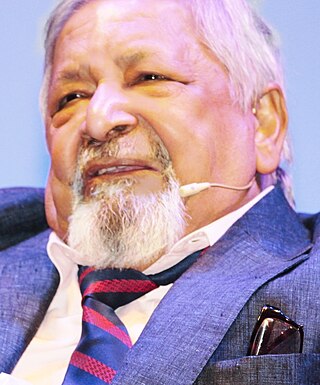
Sir Derek Alton Walcott OM was a Saint Lucian poet and playwright. He received the 1992 Nobel Prize in Literature. His works include the Homeric epic poem Omeros (1990), which many critics view "as Walcott's major achievement." In addition to winning the Nobel Prize, Walcott received many literary awards over the course of his career, including an Obie Award in 1971 for his play Dream on Monkey Mountain, a MacArthur Foundation "genius" award, a Royal Society of Literature Award, the Queen's Medal for Poetry, the inaugural OCM Bocas Prize for Caribbean Literature, the 2010 T. S. Eliot Prize for his book of poetry White Egrets and the Griffin Trust For Excellence in Poetry Lifetime Recognition Award in 2015.
Harold Sonny Ladoo was a Caribbean novelist, who was the author of two books documenting the struggles of living in poverty in the Hindu communities of Trinidad and Tobago. He moved to Canada in 1968 and was mysteriously murdered while on a visit to Trinidad in 1973.
The National Awards of Trinidad and Tobago consist of:
Caribbean literature is the literature of the various territories of the Caribbean region. Literature in English from the former British West Indies may be referred to as Anglo-Caribbean or, in historical contexts, as West Indian literature. Most of these territories have become independent nations since the 1960s, though some retain colonial ties to the United Kingdom. They share, apart from the English language, a number of political, cultural, and social ties which make it useful to consider their literary output in a single category. The more wide-ranging term "Caribbean literature" generally refers to the literature of all Caribbean territories regardless of language—whether written in English, Spanish, French, Hindustani, or Dutch, or one of numerous creoles.
Lawrence Scott FRSL is a novelist and short-story writer from Trinidad and Tobago, who divides his time between London and Port of Spain. He has also worked as a teacher of English and Drama at schools in London and in Trinidad. Scott's novels have been awarded (1998) and shortlisted for the Commonwealth Writers' Prize and thrice nominated for the International Dublin Literary Award. His stories have been much anthologised and he won the Tom-Gallon Short-Story Award in 1986.
Jamaican literature is internationally renowned, with the island of Jamaica being the home or birthplace of many important authors. One of the most distinctive aspects of Jamaican literature is its use of the local dialect — a variation of English, the country's official language. Known to Jamaicans as "patois", and now sometimes described as "nation language", this creole has become an important element in Jamaican fiction, poetry and theater.
Michel Maxwell Philip was a Trinidadian novelist, lawyer, and civil servant.
Albert Raymond Forbes Webber was a Tobago-born Guyanese politician, author and newspaper editor.

Caribbean poetry is vast and rapidly evolving field of poetry written by people from the Caribbean region and the diaspora.
Raymond R. Ramcharitar is a Trinidadian poet, playwright, fiction writer, historian and media and cultural critic.

Sir Vidiadhar Surajprasad Naipaul was a Trinidadian-born British writer of works of fiction and nonfiction in English. He is known for his comic early novels set in Trinidad, his bleaker novels of alienation in the wider world, and his vigilant chronicles of life and travels. He wrote in prose that was widely admired, but his views sometimes aroused controversy. He published more than thirty books over fifty years.
Kris Rampersad is a writer, researcher, lecturer, journalist, publisher, activist and advocate from Trinidad and Tobago.

Caribbean Voices was a radio programme broadcast by the BBC World Service from Bush House in London, England, between 1943 and 1958. It is considered "the programme in which West Indian literary talents first found their voice, in the early 1950s." Caribbean Voices nurtured many writers who went on to wider acclaim, including Samuel Selvon, Edward Kamau Brathwaite, V. S. Naipaul, Derek Walcott, John Figueroa, Andrew Salkey, Michael Anthony, Edgar Mittelholzer, Sylvia Wynter, and others.
Henry Swanzy was an Anglo-Irish radio producer in Britain's BBC General Overseas Service who is best known for his role in promoting West Indian literature particularly through the programme Caribbean Voices, where in 1946 he took over from Una Marson, the programme's first producer. Swanzy introduced unpublished writers and continued the magazine programme "with energy, critical insight and generosity". It is widely acknowledged that "his influence on the development of Caribbean literature has been tremendous".
Selwyn Cudjoe is a Trinidadian academic, scholar, historian, essayist and editor who is Professor of Africana Studies at Wellesley College. He was also the Margaret E. Deffenbaugh and LeRoy T. Carlson Professor in Comparative Literature and the Marion Butler McClean Professor in the History of Ideas at Wellesley. Cudjoe's particular expertise is Caribbean literature and Caribbean intellectual history, and he teaches courses on the African-American literary tradition, African literature, black women writers, and Caribbean literature.
Nicholas Laughlin is a writer and editor from Trinidad and Tobago. He has been editor of The Caribbean Review of Books since 2004, and also edits the arts and travel magazine Caribbean Beat. He is the festival and programme director of the NGC Bocas Lit Fest, having worked alongside founder and managing director Marina Salandy-Brown since 2011.
Jean-Baptiste Philip, sometimes spelled "Phillipe," was a Trinidad-born doctor and the leader of an activist group formed in Trinidad in 1823, which fought against the racist attitudes of colonial authorities through letters and petitions. He was a complex figure as he fought against racist attitudes of colonial authorities in Trinidad while also belonging to a Black slave-owning family. His famous work Free Mulatto pointed out the racist treatment of free Black people in Trinidad, but did not request the abolition of slavery.




